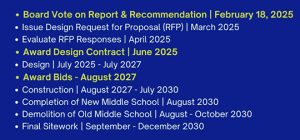With just a few days to go before the final vote, school Superintendent John Sanville fired another round in defense of his recommendation for a new middle school. Sanville recommended to the Unionville-Chadds Ford School Board on Jan. 6 that the district needs to build a school to replace C. F. Patton.
He sent out an email on Feb. 14, four days before the board votes on whether or not to issue a Request for Proposal on design services for a new school, saying “We recognize there are questions about how this project would affect community taxpayers. Some misleading information has been shared, suggesting that homeowners will face extreme tax increases to fund the project. That is not the case.” [Emphasis his.]

Sanville went on to say that the district already uses tax revenue to pay off past debt service, and that new debt from the middle school project would be treated the same way to limit financial impact.
Another point he raised is one that’s been criticized for accuracy.
“The estimated impact of the middle school project is an additional $42 per year, each year to the portion of a homeowner’s tax bill allocated to debt service, phased in over nine years. This increase is accounted for within the district’s long-term financial planning and remains within the overall tax structure, which has historically stayed below the Act 1 Index,” he wrote.
That $42 figure has been a sticking point for taxpayers who have been in opposition to the recommendation.
Mark Stookey, of Chadds. Ford has spoken out against the plan and how the finances have been presented these last several months. He saw Sanville’s email and commented that the matter is still not presented properly.
“You can see that the $42 per year number is still not explained clearly,” he said.
Sanville also said in his email that the school board directors have “an unprecedented commitment to fiscal responsibility.” [His emphasis]
He said the board resolved not to raise taxes beyond the Act 1 Index this year, an action that “underscores their dedication to working within our means while ensuring responsible stewardship of district resources.”
And he went on to say that the school board “engaged two of the nation’s top experts in municipal finance: PFM, the leading bond advisor in the country, and Stifel, the top bond underwriter in the K-12 market.
“Together, these firms have provided expert guidance to the district, helping to structure debt in a financially responsible and sustainable way. With unmatched experience in K-12 school financing, their analysis ensures that our financial approach is both sound and strategic.”
Stookey took issue with that, too.
“[T]he financial experts Sanville is talking about are the people who issue the bonds. They are not involved in the financial analysis of the projects, which is where the issues are. They are investment bankers and beholden to the district for the big bucks they will receive for issue. These firms will be involved in the issuing of bonds but will not review the highly flawed economics the district has prepared to make the actual project decision,” Stookey said in his email to Chadds Ford Live.
Stookey disagrees with Sanville on another point the superintendent made.
“Some claims circulating in the community have overstated the impact by assuming the entire cost of the project would need to be raised through new taxes alone,” Sanville wrote. “However, this ignores key financial planning strategies such as refinancing existing bonds and spreading costs over a long-term repayment period.”
Stookey disagrees.
“This is nonsense. The district plans to borrow the entire cost of the project. It all will have to be paid by taxpayers. Whatever ‘financial planning strategies’ Sanville mentions does not change the fact that the taxpayers will have to pay for the entire amount of the new building. Refinancing existing bonds only changes the timing of the payments. All of the principal has to be paid, with interest. And similarly, spreading costs over a long-term repayment period only increases the interest payments ultimately required. There is no free lunch.”
The bulk of the controversy may come to an end this coming Tuesday evening, Feb. 18 when the school board directors are scheduled to vote on the recommendation to replace Patton. The vote, specifically, will be on whether or not to issue a Request for Proposal for design services to replace the school. The meeting is scheduled to start at 7:30 p.m. at Unionville High. School.
If the board votes for the Request for Proposal in favor of Sanville’s recommendation on the 18th, then they will issue the RFP in March, evaluate the responses in April, and possibly award a design contract in June.
Assuming there are no glitches, such as the bids being higher than the $120 million estimated for the project, the bid will be awarded in August of 2027 with construction planned from August 2027 through July 2030. If the bids are higher than anticipated, the board may reevaluate, according to comments Sanville made during the Feb. 10 meeting.
District residents and property owners are urged to review the Middle School Feasibility Study found here.
About Rich Schwartzman
Rich Schwartzman has been reporting on events in the greater Chadds Ford area since September 2001 when he became the founding editor of The Chadds Ford Post. In April 2009 he became managing editor of ChaddsFordLive. He is also an award-winning photographer.

 (3 votes, average: 4.33 out of 5)
(3 votes, average: 4.33 out of 5)
Comments